
We were watching the excellent new Amazon series, The Marvelous Mrs. Maisel, which featured Lenny Bruce as a catalyst for Mrs. Maisel’s decision to do standup comedy: “Do you love it?” she asks him, and he shrugs. The first episode in the series shows how the best standup depends on authenticity, and maybe on love. I was reminded of this piece I wrote over two decades ago, republishing here…
THE LAW
Why should the average cyberdawg have any interest in Lenny Bruce?
One of the young turks of cyberpunkdom was finding my interest in Lenny hard to understand: wasn’t he just a junkie who spiked himself to death? Would I have wanted to live next door to this guy, have him shooting up in my bathroom while my kids peered through the crack in the door, wondering why Uncle Lenny wants to give himself a shot in the vein?
Drugs. It’s obvious that cyberpunk fictionoids are packed with references to drugs, and to somatic technologies mimetic of drugs, so the junkie thing might be Lenny’s link to today’s world, but oddly enough I seldom think about drugs when I think of Lenny. It’s not a drug thing, but a fringe thing. When I think of Lenny, and when I think of the sixties, I see grainy b&w Alphaville visions of urban and academic fringes, my first exposure to an alternative culture where, at the time, Lenny Bruce was as fringe as you could get…along with his compadre Paul Krassner of The Realist, who’d been a standup comic himself and was writing a column called “The Naked Emperor.” And there was Thomas Pynchon, who’s since become a course of study unto himself, but at the time was a surreal sponge slopping over with reams of drug-stained prose…and Bob Dylan, Philip Dick, William Burroughs, Maurice Girodias (of Olympia books and Evergreen Review), Charles Bukowski, Tuli Kupferberg, Tim Leary, etc. Tech wasn’t central to this picture. It was an evolving concern, especially in the context of McLuhanesque media study (though nobody’d quite envisioned the PC, since we were still using punch cards to feed data to monolithic flea-brained CPUs). Tech was the subject of a few crazy sf novels and, of course, Pynchon’s Gravity’s Rainbow (“They put the control inside!”)
What these guys and obvious others had in common was that they were on and of the fringes, living the truth of the street, alienated from the bourgeois world of calculated denial. It would have been easier to deny the immorality of a culture whose subsistence depended on oppression, repression, the exploitation of hidden masses; to go along, buy into denial, live with the war machine hidden in the basement and the hate generators buried beneath tv whitenoise. But denial can be tough for some who’re so sensitive that Truth is like a thorn in the side, a nagging concern that won’t go away.
Lenny was like that, he couldn’t go along, couldn’t buy into the denial of a world that included motherfuckers, cocksuckers, queers, perverts, and hidden demons. The police busted him for obscenity something like three or four times, they hauled him into court where, he said, he had to defend somebody else’s interpretation of his act. Yet he kept performing the same kind of act, in fact evolved a meta-act which included commentary on the court’s interpretation of his various bits. The cops and the court simply didn’t understand, they were ignorant of the street and ignorant of the voices of the street, including Lenny’s, which had transcended the street and threatened to become public record.
Compare this to what Bruce Sterling calls the “hacker crackdown,” where cops raid bbs nodes the contents of which they can’t begin to understand. It’s the same principle, and Lenny did a bit about it, about police mentality. The simple origins of law are in tribal customs that set a social contract to protect everybody, so that we literally don’t dump on each other. As the laws grow more complex and diffuse, we hire enforcers, i.e. cops, and we create courts to ensure balance. At the same time, it’s harder and harder to interpret what constitutes a crime. It’s tough for the cops to know who to bust. If a concerned, apparently upstanding, citizen reports a crime, and the cop doesn’t know enough about the context to determine whether a crime’s actually been committed, he’ll make the bust and leave it to the courts to decide…meanwhile, the bustee is out megabucks for legal defense. Ruined, perhaps, financially and psychically. That’s what happened to Lenny: is it any wonder that he spiked himself? The courts were breathing down his neck, he was broke and dependent on others for his legal defense. Drugs made him feel better, and the ultimate injection took his pain away for good.
THE BIT
Okay, this is the bit. Steve Martin said “comedy is not pretty,” and he was right. Not pretty, and often not funny, at least not anymore. How much standup can you take, vs how much you can actually see if you watch the stuff on all the cable channels, HBO and MTV and Arts & Entertainment, and you go to your local comedy clubs, all of ’em, and you watch some late night stuff, too, Jay Leno plus Arsenio times about three comix per week, that’s six more routines, however many bits per routine…how funny can all these folx be?
But that’s not really the subject of my rant, we’re talking about Lenny. He often gets the credit (blame) for the evolution of the kind confessional comedy that standups perform today, comedy that doesn’t know the restrictions on language and thematic content that Lenny fought.
The best standup routines are a form of storytelling…maybe there’s something of the epic poet in there, if you can imagine Homer standing on a rock doing ‘bits,’ and stringing these routines together so that the form the epic poems we know today, which were refined by retelling and further refined by recording…maybe someday Lenny Bruce’s bits will have evolved through bastardization into a kind of epic poetry, told originally by the master, then retold by one neurotic exhibitionist after another, a web woven from all the standup routines that ever were….(Okay, okay, epic form has dignity and heroism, the antithesis of mud dawg neurosis…it was just a thought…..)
DENIAL
Lenny Bruce was different from today’s average standup in a couple ways: first, he was truly funny, and second, he told the truth. When lamebrain psycholiterates rave about Lenny’s contribution to the free speech movement, they convey the twisted impression that Lenny suffered the slings and errors of the judicial circus so that Eddie Murphy could fuck-you- motherfucker all over the stage. Well, if you believe that, then fuck you, motherfucker! Lenny Bruce wasn’t busted because of his language, and it wasn’t for free speech that he continued to stand and fall, one bust after another. It was for Truth. Lenny made it clear, if you read his stuff, that he really wanted to respect authority, that he didn’t want to fight the establishment or any of that crap. What he wanted to do was tell the Truth, as he saw it. Actually this was more than what he wanted to do, it was what he *had to* do. He saw the world pretty much as it was, the emperor’d left his stuff at the laundromat and, as Lenny once said, we’re all the same schmuck. And in his world there were people who wanted to fuck and would play any kind of twisted game to make it happen, and there were perversions of power on every streetcorner, and there was such amazing denial…big problem in the 50s, denial, not much better now. These were the subjects of his monologues, the realities of everyday life, told in a language he heard every waking street moment, but that respectable society, whatever the fuck that might mean, chose to suppress and ignore.
Think about how weird it would be (is?) to see the “real” world of midclass establishment America totally ignoring the facts of your life! When they busted Lenny, it was like they were trying to tell him that his life, his reality, had no existence. This word, cocksucker, that got him into such trouble, was an Evil Word representing a closet reality. Amazing repression in 1950s America, and as I said, it’s not much better today. Do you think it’s better because these words are no longer taboo? Do you think it’s a better world where Eddie Murphy and Andrew Dice Clay can appear right there on television and talk gutterphile blue streaks?
Naw, man, we’re still in denial. We still lie about the essential barriers that stand between us, pretend they’re not there, avoid community, avoid heart, avoid real love… Lenny Bruce loved the characters he described, you could tell. He loved his audience. Could you say that about Eddie Murphy or any of the ten dozen standups that parade across the teevee screen every week of the year?
We’re still in denial, yes. Maybe not about the mechanics of sex, but about the gestalt of Love.
“My concept? You can’t do anything with anybody’s body to make it dirty to me. Six people, eight people, one person — you can only do one thing to make it dirty: kill it. Hiroshima was dirty. Chessman was dirty.”
“…this lady here is not obscene to me at all. And I damn anyone who will say that my mother’s body or my daughter’s body or my sister’s body is dirty. No.
“You tell me about this god of yours that made this body – but then you qualify it. You tell little children to cover up. You make it dirty. The dirty body. Well, I’m going to tell you something: this is the most decent-looking chick I’ve seen since I’ve been in town.”






